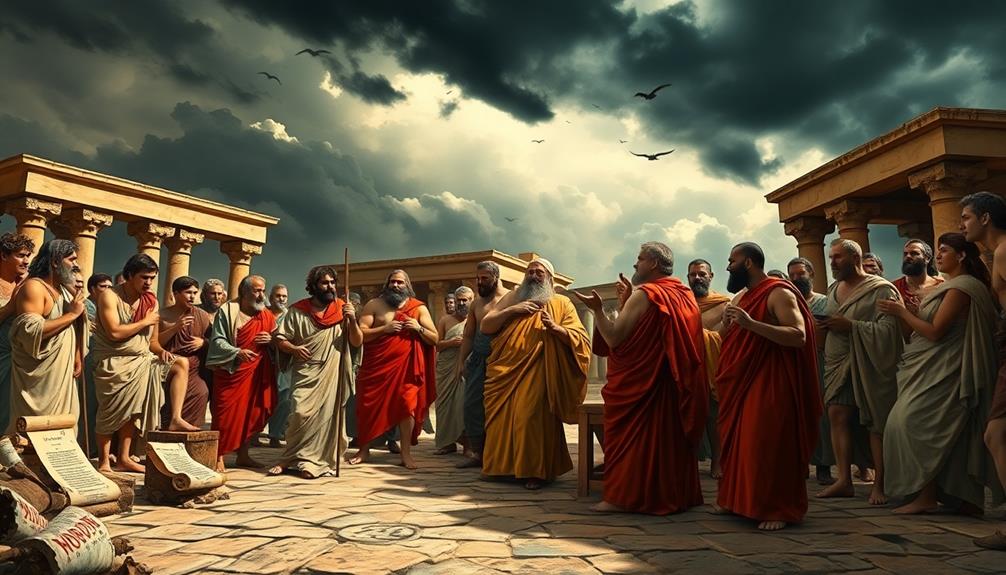Ancient skeptics greatly influence today's philosophical debates by encouraging you to question established beliefs and emphasize the importance of suspending judgment. They introduced concepts like "doxa," distinguishing between belief and opinion, and challenged the reliability of sensory perception. Their methods promote critical inquiry, which remains essential in contemporary discussions about knowledge and truth. You can see their impact in the ongoing debates between scientific realism and anti-realism, as well as the emphasis on critical thinking. By exploring ancient skepticism, you'll uncover rich ideas that continue to resonate in modern philosophy.
Key Takeaways
- Ancient skepticism promotes the suspension of judgment, encouraging a critical examination of knowledge claims still relevant in modern philosophical debates.
- The distinction between belief and knowledge, rooted in ancient thought, continues to influence contemporary discussions on epistemology and scientific realism.
- Pyrrhonian skepticism's emphasis on psychological tranquility through suspended judgment informs modern debates on mental well-being and decision-making processes.
- Skeptical methods challenge dogmatic beliefs, fostering a culture of inquiry that underpins the scientific method and critical thinking today.
- The influence of ancient skeptics is evident in contemporary philosophies that advocate for questioning perceptions and the nature of reality.
Core Concepts of Ancient Skepticism

Ancient skepticism invites you into a world of inquiry where questioning takes precedence over accepting beliefs. At its core, ancient skepticism emphasizes the suspension of judgment, steering you away from dogmatic assertions about knowledge and truth. The concept of "doxa," which refers to belief and opinion, plays an essential role in this philosophical approach.
You're encouraged to reflect on three attitudes toward impressions: assent, rejection, and the significant suspension of judgment, known as epoch.
Figures like Pyrrho and Arcesilaus challenge the certainty of knowledge, urging you to evaluate beliefs critically. They introduce practical criteria, like to pithanon, to discern which impressions deserve your assent.
Ancient skeptics didn't shy away from confronting established schools of thought, particularly the Stoic and Epicurean philosophies, which claimed to offer reliable measures of truth.
In this quest for understanding, the psychological state of suspending judgment becomes a source of tranquility. Unlike modern doubts that often breed anxiety, ancient skepticism fosters a peaceful mind, allowing you to navigate the complexities of belief and knowledge with a balanced perspective, ultimately enriching your philosophical inquiry.
Historical Context and Key Figures

Skepticism flourished during the Hellenistic period, a time marked by philosophical ferment and the challenge of established doctrines. Ancient skepticism emerged as a response to the dogmatic views of schools like Stoicism and Epicureanism, questioning the certainty of knowledge.
Pyrrho, the founder of Pyrrhonism, laid the groundwork for this movement, advocating for suspending judgment to attain tranquility. His ideas were further developed by Arcesilaus, who transformed the Academy into a skeptical school, emphasizing the impossibility of certain knowledge.
Carneades succeeded Arcesilaus and expanded skeptical arguments, introducing the practical criterion of pithanon to evaluate beliefs critically. His critiques of Stoic views on knowledge and wisdom highlighted the limitations of their epistemology.
Sextus Empiricus later documented and systematized Pyrrhonian skepticism in works like "Outlines of Pyrrhonism," reinforcing the importance of suspending judgment as a path to ataraxia.
The influence of these key figures laid a foundation for critical inquiry, shaping philosophical discussions that continue today. By questioning dogma and advocating for skepticism, they fostered a tradition that remains relevant in contemporary debates around belief and knowledge.
Belief and Judgment Dynamics

Maneuvering the complexities of belief and judgment reveals how the ancient skeptics approached the formation of opinions. They emphasized the Greek term "doxa," which highlights the interplay between belief and opinion.
Ancient skepticism teaches you to navigate conflicting impressions by practicing the suspension of judgment, or epoché. This process can be distilled into three fundamental attitudes:
- Assent: Accepting impressions as true.
- Rejection: Dismissing impressions outright.
- Suspension: Holding back judgment, allowing for doubt.
Academic skeptics like Arcesilaus and Carneades argued that you don't need absolute knowledge or firm beliefs to guide your actions. Instead, they promoted practical criteria based on plausible appearances.
In contrast, Pyrrhonian skepticism encourages a complete suspension of judgment, asserting that concepts of good and evil are merely products of opinion and custom. This perspective has significant implications for contemporary discussions on relativism and ethics.
The dialectical methods employed by ancient skeptics continue to shape modern philosophical debates about the reliability of knowledge and the importance of doubt in critical thinking.
Philosophical Investigations and Metaphysics

In diving into philosophical investigations, you'll encounter the intricate relationship between metaphysics and the quest for knowledge. Ancient skepticism, particularly through figures like Sextus Empiricus, taught you the importance of suspending judgment. This approach invites you to question the reliability of sensory perception, essential in metaphysical debates about appearances and reality.
Philosophical inquiries often revolve around the criterion of truth, a lasting challenge stemming from ancient skepticism. You're encouraged to discern true impressions amidst competing claims, a practice that resonates with contemporary epistemology. Aristotle's emphasis on formulating questions remains fundamental; it guides you in maneuvering complex metaphysical issues.
Moreover, the exploration of relational properties sheds light on the subjectivity of perception, prompting you to reflect on how these properties influence your understanding of truth.
As you engage with these concepts, you'll find that ancient skeptics paved the way for ongoing discussions about the nature of existence and the limits of human knowledge. In this landscape of philosophical investigations, the interplay of skepticism and metaphysics remains significant, challenging you to contemplate deeply on what it means to know and understand your reality.
Challenges to Skepticism

While ancient skepticism offers valuable insights into the nature of knowledge, it also faces several significant challenges that question its practicality and coherence. Critics argue that complete suspension of judgment leads to the Apraxia Charge, suggesting that if you don't make decisions, you can't act effectively in the world.
David Hume points out that our daily experiences inherently contradict skeptical principles, as you rely on some level of knowledge to navigate life.
Consider these critiques:
- Self-Refutation: If you assert that knowledge is impossible, you contradict your claim by knowing this impossibility.
- Cognitive Paralysis: Opponents argue that skepticism may lead to inaction, making meaningful decisions difficult.
- Belief-less Life: The debate around living without beliefs raises concerns about communication and engagement in philosophical discourse.
However, ancient skeptics argue that actions can still be guided by plausible appearances without firmly held beliefs.
This perspective invites a reevaluation of how we perceive judgment and knowledge, challenging the notion that skepticism inevitably leads to paralysis.
Ultimately, these challenges prompt deeper exploration of the viability of skepticism in contemporary philosophical debates.
Impact on Modern Philosophy

Ancient skepticism has profoundly shaped modern philosophy by challenging dogmatic beliefs about knowledge. The principles established by ancient skeptics, such as Carneades, laid the groundwork for critical examination in epistemology, where you question knowledge claims rather than accept them at face value. Their emphasis on the provisional nature of understanding resonates in contemporary philosophical discourse, encouraging a more nuanced approach to evaluating beliefs.
You'll notice that the dialectical methods used by Carneades have influenced how we engage with opposing views today, particularly in discussions surrounding ethics and morality. Modern skepticism mirrors ancient concerns about the reliability of knowledge, especially in fields like science, where perception plays a vital role. This reflection prompts you to reflect on how sensory experiences can shape or distort your understanding of objective truths.
Moreover, the influence of Pyrrhonism is evident in current philosophical movements advocating for the suspension of judgment. This approach fosters dialogue about the subjective nature of perception, emphasizing that certainty may be elusive.
Frequently Asked Questions
How Does Ancient Philosophy Influence Us Today?
Ancient philosophy shapes your understanding of ethics, knowledge, and existence. It encourages you to question beliefs, embrace uncertainty, and seek mental tranquility, fostering a mindset that values critical thinking and cultural perspectives in today's complex world.
What Was the Impact of Skepticism on Society?
Skepticism's like a fine lens, sharpening your focus on truth. It challenges dogmas, urges you to question norms, and cultivates open-mindedness in society, fostering tolerance and diverse perspectives essential for steering through today's complex issues.
Why Is Skepticism Important in Philosophy?
Skepticism's essential in philosophy because it pushes you to question assumptions, evaluate evidence, and seek deeper understanding. By challenging beliefs, you foster critical thinking, paving the way for more robust and nuanced perspectives on knowledge.
What Is the Influential Philosophical Position of Skepticism States That?
Skepticism asserts that you should doubt knowledge claims, emphasizing the limits of understanding. It encourages you to suspend judgment on uncertain beliefs, recognizing that perceptions are subjective and shaped by opinion and custom.
Conclusion
So, it turns out that ancient skeptics, those charming doubters of yesteryear, have a way of shaping our philosophical debates today. Who would've thought that their relentless questioning would lead us to reexamine our own beliefs? You might think you've got it all figured out, but isn't it delightful to realize that the more we understand, the more we actually don't? Embracing skepticism might just be the most certain path to wisdom we have.









